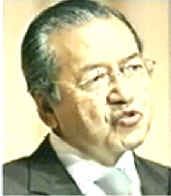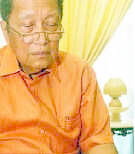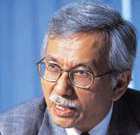Q & A with DATUK NAZRI: CABINET Refused to REVIEW Tun SALLEH ABAS Sacking; Tan Sri AZMI’s SUPPORT & REBUTTAL; OPPOSITION LEADER Total Recall on CRISIS

Sunday Interview: ‘We’re professional, not personal’
V. Vasudevan; From NST; 01 Oct 2006
The Cabinet decided this week that it would not review events that led to the sacking of three judges — Tun Salleh Abas, Datuk George Seah and Tan Sri Wan Sulaiman Pawanteh — in 1988.
It accepted the argument by Datuk Seri Nazri Aziz that there must be finality to this issue.
Still, there is disquiet over the decision not to re-open the most painful episode in the history of the judiciary. More so after Salleh’s disclosure that he was summoned to the Prime Minister’s office and given an ulimatum by Tun Dr Mahathir Mohamad: resign or face a tribunal.
The judges have maintained that they were not guilty of any misconduct. V. VASUDEVAN talks to Nazri, the country’s de facto law minister, on why the Cabinet decided not to re-open the case.
Q: Don’t you think the three judges have a right to clear their names? They have always maintained they were innocent.
A: Their fate was decided by the panel of judges. If the panel of judges felt they had nothing to answer, they would have said so.
Q: Some people say the tribunal was nothing more than a kangaroo court.
A: It is like people saying that Anwar’s (former deputy prime minister Datuk Seri Anwar Ibrahim) case was heard by a kangaroo court. Anybody can say that. It was a panel of Tun Salleh’s peers.
Q: There remain questions on the composition of the tribunal. For example, Tun Hamid Omar was on the panel and he went on to become the Lord President after Tun Salleh was sacked.
A: Put it this way. Tun Salleh was the Lord President. It means he was number one judge. You cannot find someone who was more senior than him. The next in line was Hamid. We had judges from overseas, active
Q: Still, there is a belief that Hamid stood to gain if Tun Salleh was found guilty.
A: You want to talk about Hamid Omar benefiting. There was also the other side of the argument. You must remember they were judges, there was also the possibility that Hamid Omar would not decide against his boss. There was also that worry. The fact is that you needed an active judge to be part of the tribunal. Hamid was the most senior and the right person.
Q: So you do not accept the criticism that the tribunal proceedings were a sham?
A: It wasn’t a sham. As I have said earlier, I do not believe judges want to do a deal to fix their own brother judge.
Q: Why are you so reluctant to pursue this matter of a judicial review?
A: I want you to know that I have no personal interest in this. I am looking at things objectively. I wasn’t even a party to this. I wasn’t even a minister then. I see no new facts or evidence to persuade me that there should be a review. I have been saying this from the beginning.
Q: What new facts are you looking for?
A: I am looking for new facts to show that there was a miscarriage of justice during the hearing of the tribunal. I am looking for one of the five judges who heard the case to come forward and say we were forced to make that decision.
Q: Looking at the sequence of events, you can’t help but get the impression that from the moment Tun Dr Mahathir Mohamad met Tun Salleh and asked him to resign, there were going to be questions over this whole issue.
A: I can’t confirm this as fact. It was between him and Tun Dr Mahathir. It was Tun Salleh saying something against Tun Dr Mahathir. All this happened before the tribunal hearing.
Q: Right now Tun Dr Mahathir and the government are at logger heads. The decision to remove Salleh was not popular with a whole lot of people. Would you not be scoring points, if you were to allow for a review?
A: This shows that we are being professional, not personal.
= = = = =
Blast from history - Review of 1988 Judicial Crisis; from Opposition Leader Lim Kit Siang; Time & Date:
Retired Federal Court judge, Tan Sri Azmi Kamaruddin, 73, has joined the call for a review of the 1988 judicial crisis.
Azmi was one of the five Supreme Court judges suspended in the 1988 judicial crisis, although he was later acquitted of “judicial misbehaviour” by a second kangaroo judicial tribunal which sacked two Supreme Court judges the late Tan Sri Wan Suleiman Pawanteh and Datuk George Seah. The other two Supreme Court judges who were also suspended but acquitted were Tan Sri Eusoffe Abdoolcader and Tan Sri Wan Hamzah Salleh.
The first kangaroo judicial tribunal had already earlier dismissed the then Lord President Tun Salleh Abas.
Azmi gave an interview to The Sun last Thursday, where he “pooh-poohed” the assertion of the Minister in the Prime Minister’s Department, Datuk Seri Nazri Aziz that a review of the 1988 judicial crisis would open the floodgates of similar requests for other cases, thwarting efforts to put finality to past cases.
Tan Sri Azmi Kamaruddin said: “I think this finality principle is only applicable to ordinary court cases, where you have the right to appeal.
“But in this case, we are not dealing with a court as such, but a tribunal formed under the Constitution.
“I think when there is no right for appeal, there’s no reason why we should not review it, even after 18 years.”
» There was no appeal.
» Salleh never appeared before the tribunal, so there was in fact no hearing.
» The second tribunal was heard but despite the judges’ protests, the press and the public were barred from the hearing. As such, it was more or less a secret hearing.
“We have to learn something from this episode … We are not trying to blame someone or put them in jail.
“We are not asking for Salleh or the other judges to be restored because they are already too old. We are not asking for damages, RM2 million or RM3 million or whatever,” Azmi said.
“That is not the reason here. This is more to satisfy all Malaysians on whether the original form of Article 121 should be restored, to protect judges so that judges [can make decisions] without fear or favour,” he said.
In the interview. Azmi spelt out the reasons why he believed a review of the 1988 judicial crisis is necessary. He said:
AT the recent Human Rights Day 2006 Conference, I was glad to note from newspaper reports that Tan Sri Abu Talib Othman (the Attorney – General of Malaysia in 1988 and the Chief Legal Adviser to the government when the executive launched a brutal and unforgivable attack on the judiciary) was, as ever, very conversant with the principle of separation of powers between the three organs of government namely, the executive, the legislature and the judiciary in a parliamentary democracy, as enshrined in our Merdeka Constitution.
The nagging question is, did the then Attorney-General advise the then prime minister without fear or favour on the importance of the principle of separation of powers? What exactly was his legal advice (if any) to the government and to the King? From his conduct in the two 1988 tribunals, it seems clear to many that he has probably failed to perform his constitutional duty of giving proper advice on the constitutionality of the unprecedented attack on the judiciary.
If so, this is a sufficiently good reason for right-thinking people to support the Malaysian Bar Council proposal to the government to hold an independent review or enquiry into the true circumstances and reasons leading to the 1988 attack on the judiciary and to consider seeking recommendation that other than allegation of corruption or serious crime, a judge of the Superior Court (now Federal Court) should not be suspended with a view to dismissal, but instead be subject to disciplinary action by his or her peers.
It is important to emphasise that Abu Talib should not blame and nor should he be hiding behind the skirt (so to speak) of the then Yang di-Pertuan Agong for the 1988 shameful episode. It must be clear to all lawyers and law students that constitutionally speaking, the Paramount Ruler can only act on advice, and it is seldom, if ever, His Majesty would act on his own volition when exercising his powers under the Constitution.
The principal players and advisers in the 1988 constitutional crisis were Tun Dr Mahathir Mohamad, Tun Hamid Omar and Abu Talib. Only an impartial review or enquiry after a lapse of 18 years can clear the good names of Tun Salleh Abas, Lord President, the late Tan Sri Wan Suleiman Pawanteh , Federal Court Judge, and Datuk George Seah, Federal Court Judge , and there by give consolation to these great judges and their immediate families for their sufferings and humiliation. It should be borne in mind that to any respectable judge, a suspension from office is like a life imprisonment, and a dismissal like a death sentence.
Let justice be done to our senior and respected judges. The main question for the enquiry or review commission is to consider whether the real reasons for the suspension and removal of senior judges in 1988 were justified or was the reason political in nature, namely, to ensure Mahathir’s victory against Tengku Razaleigh Hamzah in the then pending litigation before the Supreme Court on the issue of presidency of Umno?
Secondly, were all the five gentlemen appointed in Salleh’s tribunal legally qualified under the provisions of the Federal Constitution and under the rules of natural justice? (This is somewhat similar to the recent case before Datuk Hishamudin Yunus in the High Court relating to the Ayer Molek case).
Thirdly, did the second tribunal against five Supreme Court judges (of whom I was one) err in law in granting exparte leave to Salleh’s application through his counsel (Raja Aziz Addruse, a former chairman of the Bar Council) to challenge in court the constitutionality and legality of Salleh’s tribunal?
I sincerely hope the present prime minister and the government would allow an impartial enquiry or review into the 1988 tragic incident, not for the purpose of witch-hunting but purely for the purpose of justice to ensure present and future members of our judiciary will not be punished for discharging their judicial function without fear or favour. This is essential in a parliamentary democracy like ours, to ensure our present and future progress as a Malaysian nation, but also to ensure that our economic growth, particularly in terms of foreign investment, would not be affected by the nagging fear by foreigners that our judiciary is not really independent, and that Malaysia does not in fact practice parliamentary democracy and that Malaysians merely pay lip service to the principle of separation of powers based on what occurred in 1988.
I conclude by saying that “To err is human, and to forgive divine”. But, this does not mean that we should forever keep the dirt under the carpet. Sometimes it is better to wash our dirty linen in public even when it concerns a question of denial of truth and justice.
I (Lim Kit Siang) spoke about the infamous 1987 Operation Lalang and the equally infamous 1988 judicial crisis in my first budget debate in Parliament after my release from 18-month incarceration under the Internal Security Act at the Kamunting Detention Centre.
In my speech on the 1990 Budget in the Dewan Rakyat on
He said:
1.the infamous Operation Lalang for the mass arrests of critics and voices of dissent;
3.the destruction of the doctrine of the Separation of Powers to provide adequate checks and balances to ensure the smooth functioning of the parliamentary democratic system;
4.the ever-concentration of powers in the hands of the Executive, and in particular the Prime Minister, by the usurpation of powers of Parliament and the Judiciary as in the various highly undemocratic and draconian laws such as the amendments to the Federal Constitution, the Internal Security Act, the Police Act, the Printing Presses and Publications Act, and now the proposed amendments to the Societies Act.
5.the privatization of the North-South Expressway contract to the UMNO company, United Engineers Malaysia (UEM), and through it to other UMNO corporate creatures, like PLUS and TIME Engineering, veiling the proceedings and transactions from public scrutiny and accountability.
And what is the truth when the government claimed that the Operation Lalang mass arrests had the support of the people, on the ground that the arrests defused the tensions in the country so that the people could get on with their ordinary task of making a living? Was it not the truth that the defusing of the national tensions and the national sense of relief came, not from the Operation Lalang mass arrests, but the cancellation of the 500,000-people UMNO Rally planned for Nov. 1, 1987 in Merdeka Stadium after a systematic incitement of communal tensions by UMNO leaders, including UMNO Ministers?
How can the Finance Minister have the temerity to come to this House and claim that its political actions in the past few years had the support of the people, and that the government does not want to hide truth and facts?
Who was telling the truth about the great Judicial Crisis in Malaysia last year, when the Lord President and two Supreme Court Judges were sacked, and at one time, six out of nine of the Supreme Court Judges were suspended pending inquiry into their so-called “judicial misconduct”?
In his recently published book, which he co-authored with K. Das, entitled MAY DAY FOR JUSTICE, Tun Salleh Abas pointedly asked:
“Who can believe that every one of the charges against me was anything but a pathetic lie
“Who believes that I was removed for any reason other than the misbegotten belief that my presence in the Judiciary was a threat to the Prime Minister’s ambition to remain President of UMNO, and so hang on to political power?
“And who believes that the ultimate purpose of this exercise was not to cow the judiciary completely so that judges will be afraid to make findings against the Government?”
In fact, Tun Salleh Abas went on to ask very relevant and fundamental questions in his book:
 Tun Dr Mahathir, the then Prime Minister - the initiator of the Judicial Crisis?
Tun Dr Mahathir, the then Prime Minister - the initiator of the Judicial Crisis?
“Does the Prime Minister of Malaysia know what the terms “separation of powers”, “rule of law”, “natural justice” or “unwritten laws” mean?
“Was it sheer coincidence that Operation Lalang took place disabling the most effective Opposition Party in Parliament shortly before the Constitutional amendments to curb the Judiciary were passed?
“Was it really a coincidence that the least sycophantic of our newspapers were effectively shut down by Operation Lalang before the assault on the Judiciary began?
See previous posting on





0 Comments:
Post a Comment
<< Home